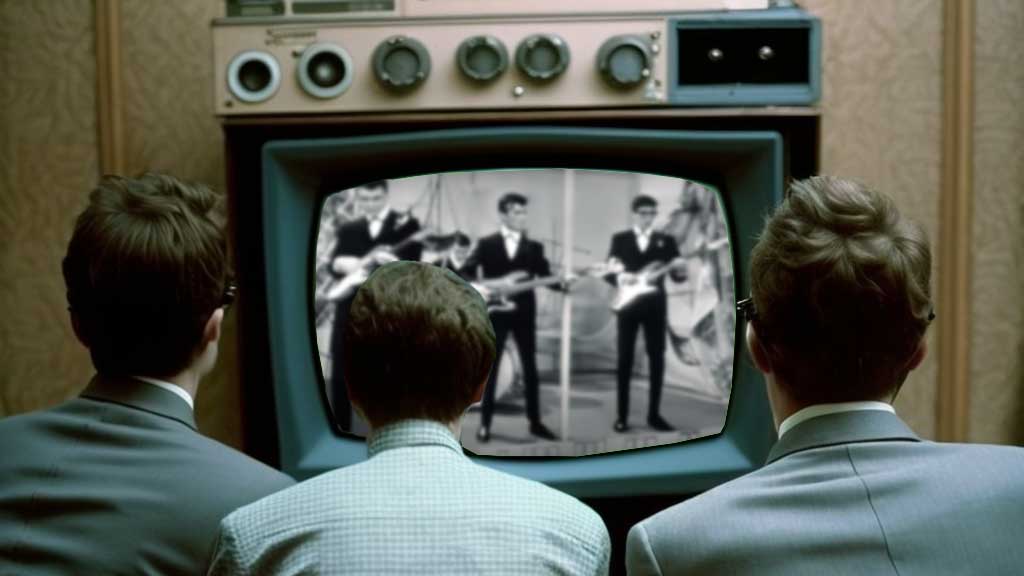10 revolutionary instrumentals that inspired the guitarists who invented rock music
Jeff Beck, Jimmy Page, Pete Townshend and the rest: They all owe so much to the instrumental artists of the 50s and 60s

Select the newsletters you’d like to receive. Then, add your email to sign up.
You are now subscribed
Your newsletter sign-up was successful
Want to add more newsletters?

Every Friday
Louder
Louder’s weekly newsletter is jam-packed with the team’s personal highlights from the last seven days, including features, breaking news, reviews and tons of juicy exclusives from the world of alternative music.

Every Friday
Classic Rock
The Classic Rock newsletter is an essential read for the discerning rock fan. Every week we bring you the news, reviews and the very best features and interviews from our extensive archive. Written by rock fans for rock fans.

Every Friday
Metal Hammer
For the last four decades Metal Hammer has been the world’s greatest metal magazine. Created by metalheads for metalheads, ‘Hammer takes you behind the scenes, closer to the action, and nearer to the bands that you love the most.

Every Friday
Prog
The Prog newsletter brings you the very best of Prog Magazine and our website, every Friday. We'll deliver you the very latest news from the Prog universe, informative features and archive material from Prog’s impressive vault.
It was the late 50s, and the lead singer was not yet the alpha species. Instead, as a generation pressed its ear against the speaker of a rickety family radio, or dropped the needle on a prized import 45, many were held spellbound by the seminal first wave of instrumental groups.
From the A-list to the esoteric, these are the turn-of-the-decade outfits who mobilised the British Invaders, without saying a word.

Booker T & The M.G.’s - Green Onions
As the Stax label’s house band, the Memphis collective would soon cement their hallowed status amongst British blues acolytes by backing up Albert King on 1967’s Born Under A Bad Sign. But in 1962, the Hammond-powered lope of their deathless Green Onions held future gods like Pete Townshend and Jeff Beck in thrall. “Steve Cropper, he just does a jab in Green Onions and it’s so cool,” recalled Beck. “They’re the kings, just wonderful players…”
Duane Eddy - Rebel Rouser
The New York twang king credited Elvis for “starting and defining” the rock‘n’roll movement, but with their route-one melodies, horn section squall and guitar tone like a greaser’s motorbike, Eddy’s instant-classic Rebel Rouser and Peter Gunn singles nudged a thousand would-be stars.
“I’ve had many guitarists come up and say they were either influenced by me or started playing because of me,” Eddy told Classic Rock. “Everybody from Jimmy Page to Mark Knopfler to Brian May. They probably would have anyway, but that gave them more excuse to rebel. I kept those melodies simple. A guy can pick up a guitar and play the first few notes of Rebel Rouser or Peter Gunn. Then you’re encouraged to go: ‘Well, I might be able to do this’.”
The Atmospheres - The Fickle Chicken
Fresh out of high school and headed for oblivion, this youthful Dallas six-piece managed just two singles before the lineup split for college – and drummer Jack Allday likely never knew the ripples that his frenetic 1959 barn-burner, The Fickle Chicken, had sent through the UK’s provincial teenage bedrooms. “A forgotten jewel,” reflected a rueful Keith Richards in his autobiography, Life. “These were the record lists of the awakening – the birth of rock and roll on UK shores.”
The Spotnicks - Orange Blossom Special
With their space suits and futuristic guitar sound, the Swedish combo were bound to appeal to almost-astronomist Brian May – while their warp-speed bluegrass pushed the future Queen man to raise his game.
Sign up below to get the latest from Classic Rock, plus exclusive special offers, direct to your inbox!
“Speed used to come into it a lot in those days,” May remembered in Guitar Player. “The Spotnicks used to do this incredibly fast stuff like Orange Blossom Special and we used to really kill ourselves – make our fingers bleed – trying to play it. Then I discovered they were speeding up the tapes to be able to play that fast.”
The Ventures - Walk Don’t Run
Scratch Don Wilson and Bob Bogle’s Washington outfit from history and a thousand US giants-in-waiting from John Fogerty to Joe Walsh might never have dreamt big. Across the water, too, the chop and twang of their 1960 surf benchmark Walk Don’t Run made UK No.8, and left an indelible mark on George Harrison, Lemmy, Keith Moon and more.
“When I was about 12,” recalled Peter Frampton, “I formed a group called The Truebeats. And unfortunately I did think of that awful name. We were like a cardboard copy of The Shadows and The Ventures.”
The Tornados - Telstar
Written by producer Joe Meek, the space-cowboy wobble of The Tornados’ chart-topper Telstar didn’t just inspire the class of ‘62 – it was even referenced in the post-millennium on Muse’s Knights Of Cydonia (no coincidence, as rhythm guitarist George Bellamy is Matt Bellamy’s dad).
Santo & Johnny - Sleep Walk
Brooklyn-born siblings Santo and Johnny Farina might have forgotten their immortal steel-guitar ballad Sleep Walk if their father, listening through the walls, hadn’t encouraged them to revisit it and paid for a Webcor tape recorder to lay down a rough cut. Good thing, as the lilting instrumental became a vital strand of British rock’s DNA, cited as a key influence on Fleetwood Mac’s Albatross (which fed into The Beatles’ Sun King).
“Eric Clapton and Jeff Beck,” noted Johnny of the A-list covers, “put the style on Sleep Walk that they’re known for – heavy.”
Link Wray - Rumble
Jimmy Page has never been so beautifully unguarded on camera as the moment in 2008’s guitar documentary, It Might Get Loud, when the Led Zeppelin man retrieves an original 45 of the Native American bandleader’s 1958 hit Rumble, plays air guitar to its anarchic judder-riff and provides a running commentary on the vibrato-drenched tone.
“Most of my day was spent going through these records, listening to sounds or playing guitar with the sounds,” remembers Page. “But the first time that I heard the Rumble, it was something that just had so much profound attitude.”
Nero And The Gladiators - In The Hall Of The Mountain King
Performing in Roman togas under the command of laurel wreath-wearing keys man Mike O’Neill, Nero And The Gladiators had the whiff of novelty – but one Ritchie Blackmore took them seriously.
“I saw them when I was 15,” he recalled. “They were playing all this classical music rocked-up. It would be In The Hall Of The Mountain King by Edvard Grieg. I was mesmerised by this band. I’ve never been so moved by a band onstage. Everybody else was playing Chuck Berry and stuff like that.”
The Shadows - Apache
Obvious but undeniable. The beguiling twang of Hank Marvin’s crystalline Fender Strat on benchmarks like Apache and Man Of Mystery might have been the antithesis of the speaker-slashing rock scene on the horizon, but it left none of the British invaders untouched.
Jeff Beck once saluted Marvin as “my closest source… knowing that he was on English soil was a big inspiration”, while Peter Frampton summed up his seismic impact in an interview with Mix Online: “If you speak to Mark Knopfler, Pete Townshend, Keith Richards, they’ll all mention Hank at some point in their beginnings. He was the guru for us."
Henry Yates has been a freelance journalist since 2002 and written about music for titles including The Guardian, The Telegraph, NME, Classic Rock, Guitarist, Total Guitar and Metal Hammer. He is the author of Walter Trout's official biography, Rescued From Reality, a music pundit on Times Radio and BBC TV, and an interviewer who has spoken to Brian May, Jimmy Page, Ozzy Osbourne, Ronnie Wood, Dave Grohl, Marilyn Manson, Kiefer Sutherland and many more.

